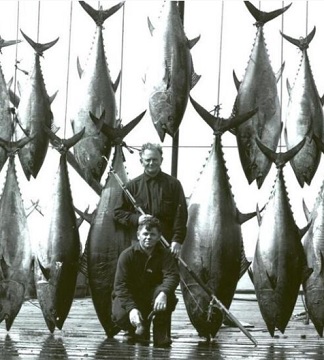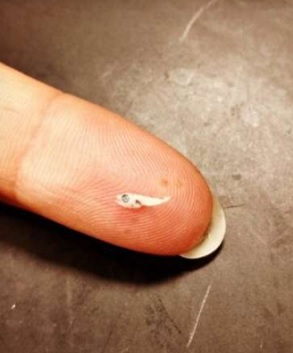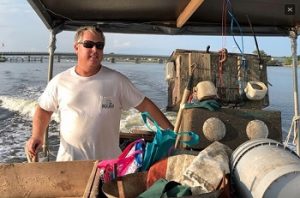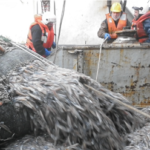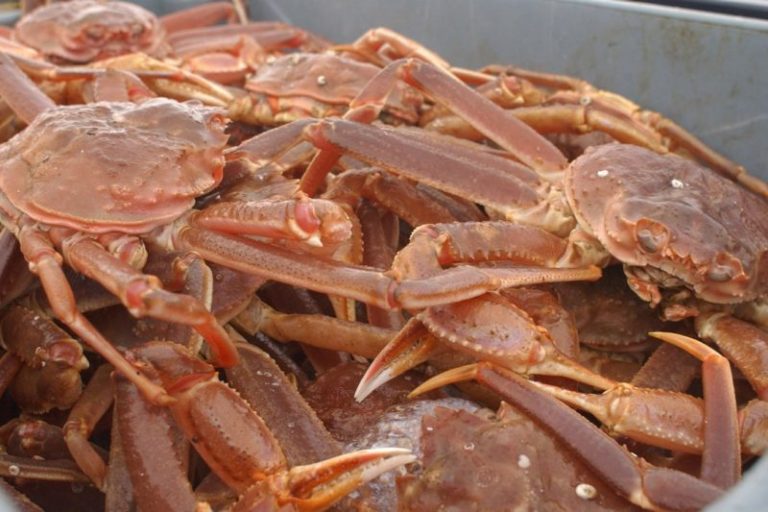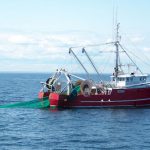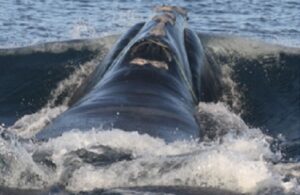Tag Archives: Atlantic Bluefin tuna
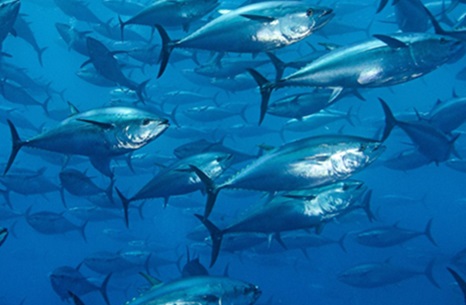
Bluefin Tuna Get It On off North Carolina
In November 1981, a fleet of briefcase-toting lobbyists, scientists, and political negotiators gathered in sunny Tenerife, Spain, to decide the fate of Atlantic bluefin tuna. Representing more than a dozen countries, including Canada, the United States, Spain, and Italy, the besuited men knew crisis loomed. Since the early 1970s, rising global demand for bluefin flesh had spurred fishing fleets—hailing from ports on both sides of the Atlantic Ocean—to kill untold thousands of the wide-ranging predator every year. Under this heavy fishing pressure, primarily driven by the Japanese appetite for sushi-grade tuna, the species careened toward collapse. During the meeting in Tenerife, the American delegation to the International Commission for the Conservation of Atlantic Tunas proposed a disarmingly simple solution: they would draw a line down the middle of the Atlantic Ocean and split the bluefin into two separate stocks. >>click to read<< 08:19
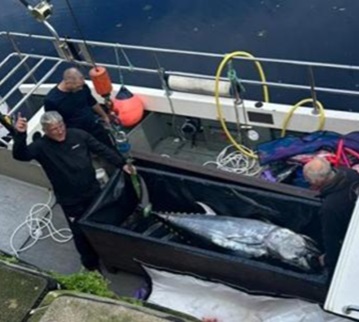
Could bluefin tuna become Scotland’s new ‘silver darlings’?
For years, Atlantic bluefin tuna were a rare sight in Scottish waters, with their numbers depleted as their prime source of food – herring and mackerel – landed instead on the nation’s dining tables. So, when skipper Angus Campbell’s fishing boat Aqua SY 210 pulled up alongside the quay at Stornoway a few weeks ago, the whopping bluefin tuna his crew had landed – 10ft long and weighing 164kg – strung up for curious locals to see, there was more than a little interest. “It was definitely very exciting,” says Mr Campbell, who has been fishing the waters off the Isle of Harris since he was just 15 years old. It was Scotland’s first commercially caught Atlantic bluefin tuna for decades. >>click to read<< 09:48
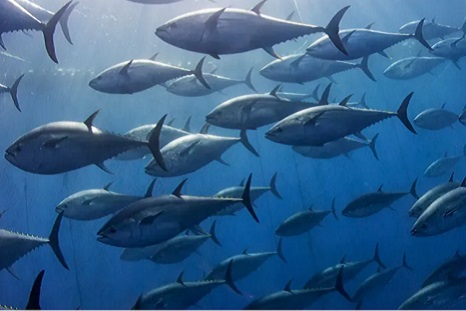
In bluefin tuna, fisheries science is never neat
Pinchin’s eponymous kings are Atlantic bluefin tuna, marine predators that can weigh well over a thousand pounds, “imagine a grand piano shaped like a nuclear weapon,” as Pinchin puts it. Bluefin are extraordinary organisms: warm-blooded, keen-eyed, coated in pigment-producing cells that flash a rainbow of colors when the fish are hauled onto a boat. Pinchin excels at evoking her piscine subjects, whose sickle-shaped tails beat nearly as fast as a hummingbird’s wing. “To stand beside a just-landed giant bluefin, still slick from salt water, feels akin to standing beside a natural marvel like Niagara Falls or an erupting volcano,” writes Pinchin, a Nova Scotia-based science journalist. “There’s beauty, but also danger.” Her book isn’t just an ode to bluefin — it’s about humankind’s obsession with them, a fixation as old as our species. >click to read< 16:29
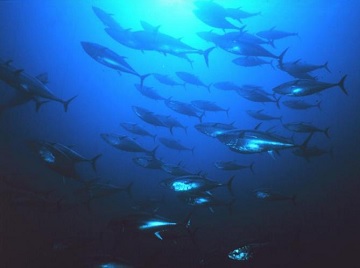
What’s on the line? Atlantic bluefin tuna
The Atlantic bluefin tuna season ranks high enough up on the fishing world calendar that the fish even has two of its own television shows. This species is one of the largest open ocean migratory species of finfish found in the northwest Atlantic. Many fish are caught weighing well over 1,000 pounds and measuring 8 feet or more in length. In North Carolina, the Atlantic bluefin tuna can be found year-round at varying degrees of availability, but are usually the most plentiful from January through March and into April off the Outer Banks, and November through December, with fish numbers increasing in October. >click to read< 11:57
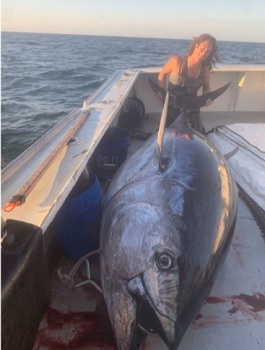
After Epic Fish Fight, Seabrook Woman Reels in a Massive Bluefin
If I want to be a bona fide badass like Michelle Bancewicz Cicale from Seabrook, I have some work to do. But hey, you gotta start somewhere! Michelle has been fishing most of her life. Like most things, if you implement the three P’s, practice, patience, and persistence you are bound to get better at it. In 2015 she started fishing mostly for tuna and in 2019 she bought her own boat. “No Limits” seems like an appropriate name for Michelle’s boat.
>click to read< 07:37
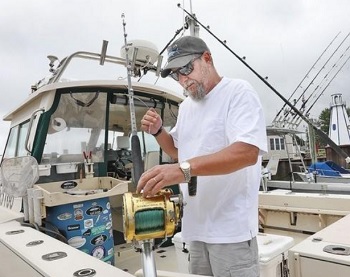
South Shore fishermen are finding demand for Atlantic bluefin tuna is way down
“It’s all about supply and demand and there’s no demand for them, so the dealers don’t want to keep buying them if they’re not able to keep selling them,” fisherman Greg Ares, based out of Green Harbor in Marshfield, said. “Maybe within the next week or two, restaurants will be opened up in the U.S., sushi restaurants, and they will purchase our bluefin tuna. Even if I get $6 a pound, that’s good enough to keep going.” American Bluefin Tuna Association President David Schalit said price has not really changed. “What has changed is the demand,” he said. “The demand is way, way off. Restaurants in the U.S. are barely open, some are maybe selling takeaway, some are still closed and in the Boston or New York areas, you see tables on the sidewalk.” >click to read< 15:14
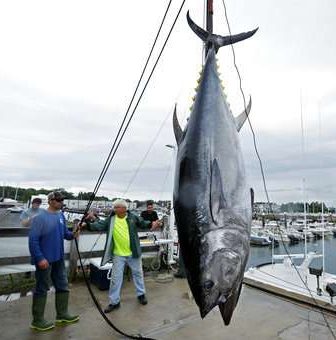
A controversial comeback for a highly prized tuna
“There’s probably no fish that’s ever been more politicized than Atlantic bluefin tuna,” said Golet, a University of Maine professor. “People get a passion for this fish. And people are making a living off of this fish.” The fish have long been at the center of a battle among commercial fishermen who can make a huge amount of money on a single fish, environmentalists who see them as marvels of marine migration, and consumers who pay a hefty price for them in restaurants.,, But international regulators say the species has recently recovered enough that it can withstand more fishing, and U.S. ocean managers implemented an increase of about 17 percent for this summer, to the delight of fishing groups. The decision prompted environmental groups to renew their calls for holding the current line on quotas. >click to read<08:30

THE 2018 MAKO SEASON IS SAVED!
The United States and other nations recently finished up a week of tuna, swordfish and shark management discussions at the 2017 annual meeting of International Commission for the Conservation of Atlantic Tunas (ICCAT) in Marrakech, Morocco. The good news from overseas is that there’s a bluefin tuna quota increase coming for U.S. fishermen; perhaps even better news is that motions by some ICCAT delegates to shut down the North Atlantic mako shark fishery failed (though an increase in harvest size is forthcoming.),,, The final agreement focuses on measures to reduce fishing mortality and efforts to further strengthen data collection, while protecting opportunities for U.S. recreational and commercial fishermen to retain small amounts of shortfin mako sharks. click here to read the story 15:35

Nations decide to increase quota for Atlantic Bluefin tuna
Countries fishing the eastern Atlantic and the Mediterranean agreed Tuesday to expand the annual quota for prized Bluefin tuna to reflect an improvement in their stocks. Two officials at the meeting of the 50-nation International Commission for the Conservation of Atlantic Tunas said that at the end of the meeting Tuesday, countries have agreed to hike the quota from 24,000 tons this year to 28,000 next year, with a further 4,000 added in each of the following two years. The officials spoke on condition of anonymity because the decision has not been officially announced yet. click here to read the story 12:26
Atlantic bluefin tuna stocks are rebounding — but raising quota proves controversial
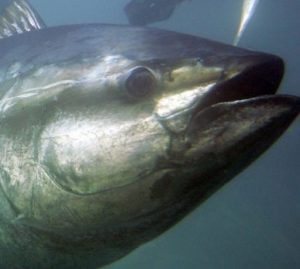 Fishermen up and down the New England coast say it has been decades since they’ve been able to catch so many Atlantic bluefin tuna, so fast. Once severely depleted, populations of the prized sushi fish appear to be rebuilding. Now the industry and some scientists say the international commission that regulates the fish can allow a much bigger catch. But some environmental groups disagree.,, click here to read the story 09:18
Fishermen up and down the New England coast say it has been decades since they’ve been able to catch so many Atlantic bluefin tuna, so fast. Once severely depleted, populations of the prized sushi fish appear to be rebuilding. Now the industry and some scientists say the international commission that regulates the fish can allow a much bigger catch. But some environmental groups disagree.,, click here to read the story 09:18
Countries Pledge To Recover Dwindling Pacific Bluefin Tuna Population
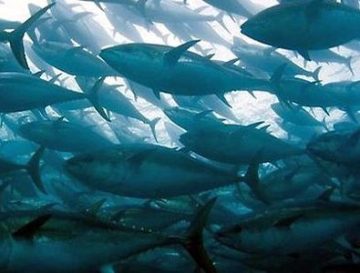 In a joint meeting Friday in Busan, South Korea, the two groups that manage Pacific bluefin tuna reached a historic long-term agreement that would put the species on the path to recovery. The Western and Central Pacific Fisheries Commission and the Inter-American Tropical Tuna Commission agreed to take steps to rebuild the population to 20 percent of historic levels by 2034 — a sevenfold increase from current levels. Stocks of Pacific bluefin have fallen to 2.6 percent of their historic size, with countries like Mexico, Japan, Korea and the U.S. exceeding fishing quotas within the last two years. click here to read the story 17:02
In a joint meeting Friday in Busan, South Korea, the two groups that manage Pacific bluefin tuna reached a historic long-term agreement that would put the species on the path to recovery. The Western and Central Pacific Fisheries Commission and the Inter-American Tropical Tuna Commission agreed to take steps to rebuild the population to 20 percent of historic levels by 2034 — a sevenfold increase from current levels. Stocks of Pacific bluefin have fallen to 2.6 percent of their historic size, with countries like Mexico, Japan, Korea and the U.S. exceeding fishing quotas within the last two years. click here to read the story 17:02

Spain’s 3,000-Year-Old Tuna Harvest in Pictures
Atlantic bluefin tuna are among the most hunted species on the planet and one of the best ways to see the effects of an increasingly industrialized food chain. But for a few short weeks during early summer on Spain’s southern coast, an ancient ritual known as the almadraba still plays out—an intense, intimate, and violent tradition that strives to harvest some of the world’s most valuable seafood in a sustainable manner. Photographer Michael Magers traveled to Spain in 2015 to join a small crew of fisherman in the economically depressed town of Barbate and document the spectacle. Click here to view the images 08:45
Deepwater Horizon oil spill impacted bluefin tuna spawning habitat in Gulf of Mexico
The Deepwater Horizon oil spill was one of the largest environmental disasters in history, releasing roughly 4 million barrels of crude oil into the Gulf of Mexico. For Atlantic bluefin tuna, it occurred at the worst time of year, during peak spawning season, when eggs and larval fish that are particularly vulnerable to environmental stressors exist in mass quantity. In a study (click here)published in Nature: Scientific Reports, scientists from Stanford and NOAA provide the best yet analysis of how the 2010 breeding season might have been impacted by the oil spill. Although the spill encompassed a relatively small proportion of the bluefin tuna spawning grounds, which extend throughout the northern Gulf of Mexico, the authors showed the cumulative oiled tuna habitat was roughly 3.1 million square miles, representing the potential for a significant impact on eggs and larval bluefin tuna in the Gulf of Mexico. Read the story here 13:43
Department of Fisheries and Oceans Rejects COSEWIC’s Species-at-risk designation of Atlantic bluefin tuna
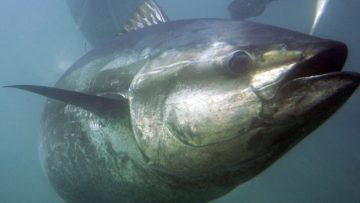 Canada’s Department of Fisheries and Oceans has rejected advice to list the Atlantic bluefin tuna as an endangered species. The long-awaited recommendation should preserve the region’s $10-million bluefin tuna fishery, industry representatives say. The department says western Atlantic bluefin tuna stocks have been rebuilding since 2011, when the Committee on the Status of Endangered Wildlife in Canada said tuna should be listed as an endangered species under federal species-at-risk legislation. That would have made it illegal to kill, harm or capture the giant fish. Glenn MacKenzie of the Gulf Nova Scotia Tuna Association said he was “very relieved.” He’s one of 135 commercial tuna fishermen who fish from the Nova Scotia side of the Gulf of Saint Lawrence. Read the story here 19:27
Canada’s Department of Fisheries and Oceans has rejected advice to list the Atlantic bluefin tuna as an endangered species. The long-awaited recommendation should preserve the region’s $10-million bluefin tuna fishery, industry representatives say. The department says western Atlantic bluefin tuna stocks have been rebuilding since 2011, when the Committee on the Status of Endangered Wildlife in Canada said tuna should be listed as an endangered species under federal species-at-risk legislation. That would have made it illegal to kill, harm or capture the giant fish. Glenn MacKenzie of the Gulf Nova Scotia Tuna Association said he was “very relieved.” He’s one of 135 commercial tuna fishermen who fish from the Nova Scotia side of the Gulf of Saint Lawrence. Read the story here 19:27
Potential Western Atlantic spawning area found for Atlantic bluefin tuna
 Scientists from NOAA’s National Marine Fisheries Service (NOAA Fisheries) and the University of Massachusetts Boston have found evidence of Atlantic bluefin tuna spawning activity off the northeastern United States in an area of open ocean south of New England and east of the Mid-Atlantic states called the Slope Sea. The findings, to be published March 7 in the Proceedings of the National Academy of Sciences, suggest that the current life-history model for western Atlantic bluefin, which assumes spawning occurs only in the Gulf of Mexico, overestimates age-at-maturity. For that reason, the authors conclude that western Atlantic bluefin may be less vulnerable to fishing and other stressors than previously thought. Read the rest here 20:18
Scientists from NOAA’s National Marine Fisheries Service (NOAA Fisheries) and the University of Massachusetts Boston have found evidence of Atlantic bluefin tuna spawning activity off the northeastern United States in an area of open ocean south of New England and east of the Mid-Atlantic states called the Slope Sea. The findings, to be published March 7 in the Proceedings of the National Academy of Sciences, suggest that the current life-history model for western Atlantic bluefin, which assumes spawning occurs only in the Gulf of Mexico, overestimates age-at-maturity. For that reason, the authors conclude that western Atlantic bluefin may be less vulnerable to fishing and other stressors than previously thought. Read the rest here 20:18
Marine Matters: “Oh, I’ve got the blues so bad . . .”
 Are you feeling blue? I’m not. It’s mid-July, the weather is warm, the Japanese beetles have not yet decimated my garden, and I just ate my first fresh pea. So despite the fact that this weekend will be full of the mournful notes of the North Atlantic Blues Festival, I am feeling quite cheerful. And so too are Atlantic bluefin tuna. In April the National Marine Fisheries Service (NMFS) Office of Sustainable Fisheries announced that Atlantic bluefin tuna were one of six fish species to be . Read the rest here 09:35
Are you feeling blue? I’m not. It’s mid-July, the weather is warm, the Japanese beetles have not yet decimated my garden, and I just ate my first fresh pea. So despite the fact that this weekend will be full of the mournful notes of the North Atlantic Blues Festival, I am feeling quite cheerful. And so too are Atlantic bluefin tuna. In April the National Marine Fisheries Service (NMFS) Office of Sustainable Fisheries announced that Atlantic bluefin tuna were one of six fish species to be . Read the rest here 09:35
Study unveils why Atlantic bluefin tuna suffer despite prey abundance
 In a paper in the journal Marine Ecology Progress Series titled “The paradox of the pelagics: why bluefin tuna can go hungry in a sea of plenty,” the seven authors outlined how the overall condition (fat content) of Atlantic bluefin tuna in the Gulf of Maine declined despite an abundance of Atlantic herring — their preferred prey. The population of Atlantic herring has increased over the past two decades suggesting that foraging conditions should have been favorable for bluefin tuna. A decline in bluefin tuna condition despite,,, Read the rest here 10:26
In a paper in the journal Marine Ecology Progress Series titled “The paradox of the pelagics: why bluefin tuna can go hungry in a sea of plenty,” the seven authors outlined how the overall condition (fat content) of Atlantic bluefin tuna in the Gulf of Maine declined despite an abundance of Atlantic herring — their preferred prey. The population of Atlantic herring has increased over the past two decades suggesting that foraging conditions should have been favorable for bluefin tuna. A decline in bluefin tuna condition despite,,, Read the rest here 10:26
Large Pelagics Research Center and “Wicked Tuna”s Captain Bill “Hollywood” Muniz – Tracking Atlantic Bluefin Tuna
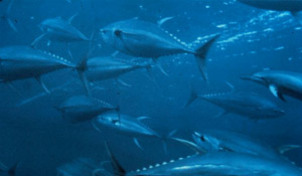 Large Pelagics Research Center, Molly Lutcavage’s Gloucester-based research team will collaborate with long-term tuna research partners and stars of television’s “Wicked Tuna” series, Captain Bill “Hollywood” Muniz and his spotter, Mark Brochu. Wayne Perryman, leader of a NOAA project using hexacopters to study killer whales off the coast of British Columbia, is advising the UMass Amherst group on this project. Read the rest here 09:55
Large Pelagics Research Center, Molly Lutcavage’s Gloucester-based research team will collaborate with long-term tuna research partners and stars of television’s “Wicked Tuna” series, Captain Bill “Hollywood” Muniz and his spotter, Mark Brochu. Wayne Perryman, leader of a NOAA project using hexacopters to study killer whales off the coast of British Columbia, is advising the UMass Amherst group on this project. Read the rest here 09:55
“Anecdotal Information” is what the professional fisheries people call it, usually dismissively
First off, A Mia Culpa. In the last FishNet, which was distributed in early October, I referred to “ (or actually an almost-assessment).” It was pointed out to me, and rightfully so, that this could have left readers with the impression that this was somewhat less accurate and/or reliable than a “real” assessment of the cod stock. I was assured that this wasn’t the case and,,, Plus, When you’re used to those big bucks you’ve gotta keep ‘em coming in, and,Great news on Atlantic bluefin tuna – Read the rest here 11:19:58
Atlantic bluefin tuna: Sienna Miller and Stephen Fry among those credited with raising awareness of overfishing danger LMAO!
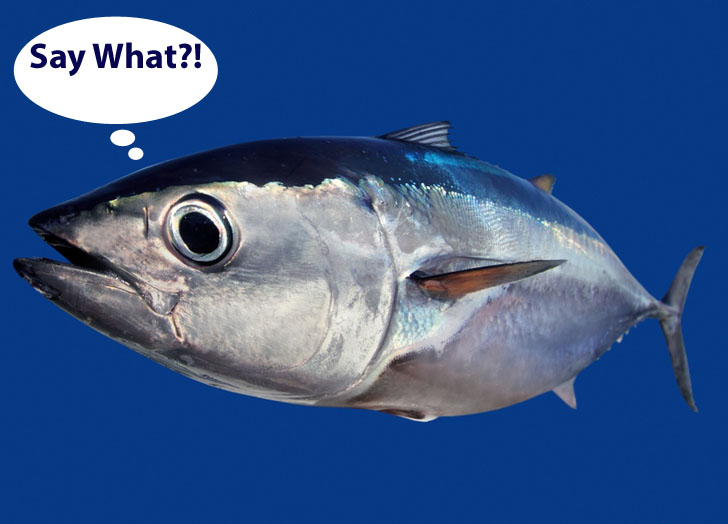 Celebrities who have campaigned for Atlantic bluefin tuna to be kept out of the cooking pot may soon have to find a new fish to champion after scientists concluded the species is on the mend. Sienna Miller, Greta Scacchi, Elle Macpherson and Stephen Fry are among the stars to have called for an end to the overfishing that was devastating stocks.Scacchi went so far as to pose naked, along with Emilia Fox and, Read the rest here 15:30
Celebrities who have campaigned for Atlantic bluefin tuna to be kept out of the cooking pot may soon have to find a new fish to champion after scientists concluded the species is on the mend. Sienna Miller, Greta Scacchi, Elle Macpherson and Stephen Fry are among the stars to have called for an end to the overfishing that was devastating stocks.Scacchi went so far as to pose naked, along with Emilia Fox and, Read the rest here 15:30
200 tons of illegally caught Atlantic bluefin tuna show how we’re driving these fish to extinction
 Atlantic bluefin tuna is tasty. So tasty, in fact, that the fish is also endangered. There are now only half the number of Atlantic bluefin tuna in the sea that there were in 1970. That’s despite rules set by governments around the world that have restricted tuna fishing, with the goal of leaving enough of them in the sea to reproduce faster than they’re being caught Read more here 14:54
Atlantic bluefin tuna is tasty. So tasty, in fact, that the fish is also endangered. There are now only half the number of Atlantic bluefin tuna in the sea that there were in 1970. That’s despite rules set by governments around the world that have restricted tuna fishing, with the goal of leaving enough of them in the sea to reproduce faster than they’re being caught Read more here 14:54
Nova Scotia tuna fishermen say Shea, MacAulay pandering to locals
![]() Federal Fisheries Minister Gail Shea says the fear of longliners entering the Gulf of St. Lawrence to fish tuna this year is a non-issue being fanned by Cardigan MP Lawrence MacAulay. However, Troy Atkinson, president of the Nova Scotia Swordfishermen’s Association, takes issue with both federal politicians and says they are pandering to their constituents with the bluefin catch. capebretonpost Read more here 21:45
Federal Fisheries Minister Gail Shea says the fear of longliners entering the Gulf of St. Lawrence to fish tuna this year is a non-issue being fanned by Cardigan MP Lawrence MacAulay. However, Troy Atkinson, president of the Nova Scotia Swordfishermen’s Association, takes issue with both federal politicians and says they are pandering to their constituents with the bluefin catch. capebretonpost Read more here 21:45
Fished out – Atlantic fishing nations fail to act to protect tuna and sharks.
 The ICCAT nations did maintain catch limits on Atlantic bluefin tuna. They also announced steps to force large fishing vessels to carry a unique identification number beginning in 2016, after many cases of illegal fishing off West Africa, with ships often changing names and flags in order to evade sanctions over illegal fishing. “Sharks is where they really dropped the ball,” said Elizabeth Wilson, director of the Pew Charitable Trusts’ international ocean policy unit, which had observer status at the gathering. “There was very little discussion about sharks. They barely even talked about it in their meetings, which is very disappointing,” she said in a phone interview after the meeting ended. more@thestar 10:22
The ICCAT nations did maintain catch limits on Atlantic bluefin tuna. They also announced steps to force large fishing vessels to carry a unique identification number beginning in 2016, after many cases of illegal fishing off West Africa, with ships often changing names and flags in order to evade sanctions over illegal fishing. “Sharks is where they really dropped the ball,” said Elizabeth Wilson, director of the Pew Charitable Trusts’ international ocean policy unit, which had observer status at the gathering. “There was very little discussion about sharks. They barely even talked about it in their meetings, which is very disappointing,” she said in a phone interview after the meeting ended. more@thestar 10:22
Proposed Tuna Regs Unfairly Target New England Fleet
 Maine’s congressional delegation is urging federal regulators to revise proposed rule changes for the management of Atlantic bluefin tuna. The concern – which is shared by lawmakers from other coastal New England states – is that the region’s traditional, near-shore tuna fleet is being unfairly targeted for a problem over which they have no control. But federal regulators say that’s not the case. Tom Porter has more@mpbn 19:31
Maine’s congressional delegation is urging federal regulators to revise proposed rule changes for the management of Atlantic bluefin tuna. The concern – which is shared by lawmakers from other coastal New England states – is that the region’s traditional, near-shore tuna fleet is being unfairly targeted for a problem over which they have no control. But federal regulators say that’s not the case. Tom Porter has more@mpbn 19:31
ICCAT decides to help conserve Atlantic bluefin tuna
 At the conclusion of their week-long meeting in Agadir, 48 member governments of the International Commission for the Conservation of Atlantic Tunas (ICCAT) this week adopted positive measures that will help conserve the iconic Atlantic bluefin tuna, and advance shark protection in the future. But they deferred meaningful action on other pressing matters. more@fis
At the conclusion of their week-long meeting in Agadir, 48 member governments of the International Commission for the Conservation of Atlantic Tunas (ICCAT) this week adopted positive measures that will help conserve the iconic Atlantic bluefin tuna, and advance shark protection in the future. But they deferred meaningful action on other pressing matters. more@fis
Bluefins lure famed fishing boat captain – Linda Greenlaw will join anglers on chartered tours chasing one of the world’s most sought-after fish.
![]() PORTLAND – Trying to get a fisherman to divulge secrets, especially about favorite fishing holes, is usually a waste of time. But this summer, anglers will have a chance to learn from one of the best: Linda Greenlaw, the Maine fishing boat captain made famous by the book “The Perfect Storm.” Greenlaw, an Isle au Haut resident, author and world-renowned fisherman, continued
PORTLAND – Trying to get a fisherman to divulge secrets, especially about favorite fishing holes, is usually a waste of time. But this summer, anglers will have a chance to learn from one of the best: Linda Greenlaw, the Maine fishing boat captain made famous by the book “The Perfect Storm.” Greenlaw, an Isle au Haut resident, author and world-renowned fisherman, continued
Fisheries nations set to discuss bluefin tuna
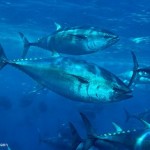 The United States, another key player at the negotiations, has said it supports “the rebuilding and term sustainable management of the western and eastern Atlantic bluefin tuna stocks by adopting science-based and precautionary conservation and management measures that ensure continued stock growth.” But environmentalists also said it was too early to celebrate.
The United States, another key player at the negotiations, has said it supports “the rebuilding and term sustainable management of the western and eastern Atlantic bluefin tuna stocks by adopting science-based and precautionary conservation and management measures that ensure continued stock growth.” But environmentalists also said it was too early to celebrate.






